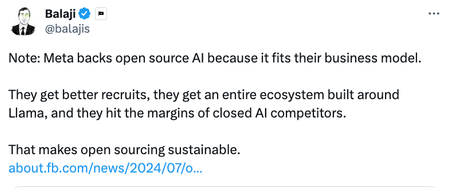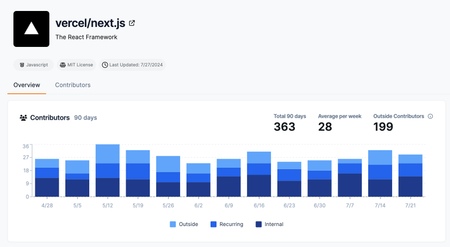
The Compound Interest of Open Source: How Collaboration Leads to Growth
BekahHW
7 mins read

I recently came across this post, and it got me thinking about open source in terms of compound interest - open source contributions can lead to exponential growth in project value, creating opportunities for growth and collaboration that transcend individual efforts.
Each contribution to an open source project, then, no matter how small, compounds over time. Let's think about this as an analogy to compound interest in finance, but instead of money, we're dealing with knowledge and connection.
Here's how it plays out:
- Initial Contribution: A developer contributes a piece of code or an idea (bug or feature issue).
- Iteration: Another contributor builds upon or refines this initial input. They might refine the code, optimize it for better performance, or extend its functionality.
- Expansion and Integration: Another contributor, building on the work of the first two, expands on their ideas or integrates them with other concepts. This step is about taking existing work and pushing it further, sometimes in ways the original contributors didn't anticipate.
- Scale: This process doesn't stop here – it repeats thousands of times across a global open source ecosystem. Each iteration builds on the collective knowledge and work of the community. A small UI fix might evolve into a comprehensive design system or even inspire new tools and libraries.
- Cross-pollination: As contributors work on different projects, ideas and solutions from one project influence another.
The result? We can move faster than if we rely solely on individual efforts. Even small contributions can have a significant impact over time, thanks to the compound effect of collaboration.
The Numbers Behind the Network
To understand the scale of this effect, let's look at some open source metrics:
- The Linux kernel has had over 20,000 contributors since its creation.
- Each new Linux release typically has contributions from more than 1,000 developers.
- According to the Linux Kernal Report from 2020, "From 2007 to 2019, there were 780,048 commits accepted into the Linux kernel from 1730 organizations." That's close to averaging 90 organizations per year.
This diversity of contributors is key here. Research shows that more diverse contributor bases lead to more innovative outcomes, because each unique perspective adds a new perspective to problem-solving.
"No matter who you are, most of the smartest people work for someone else." - Bill Joy, Co-founder of Sun Microsystems
Cross-Pollination of Ideas
This compound knowledge effect isn't just additive — it's multiplicative. When ideas from different fields intersect, we often see breakthroughs that transcend their origins. A prime example is how GPU technology, initially developed for gaming, has become necessary for AI development and cryptocurrency mining.
The Compound Interest of Open Source: Gains and Risks
Just as compound interest can rapidly grow wealth in finance, the compound effect in open source can lead to growth in project value. However, like any investment, open source projects can face challenges that mirror financial risks.
Positive Compound Effect
When a project has a healthy, active community, the benefits compound:
- Each contribution builds on previous work
- New contributors bring fresh perspectives
- Cross-pollination of ideas leads to innovative solutions
- The project's value to the community grows
We can look at open source metrics to better understand when this will happen.
The Reverse Compound Effect
However, the compound effect works both ways. When contributions to a project slow down or stop entirely, we see a reverse compound effect:
- The project loses momentum
- It becomes outdated
- Eventually, it may become obsolete
This is similar to how inflation can erode the value of money that's not earning interest.
While having dedicated core contributors is valuable, an over-reliance on a small group can be risky for a project's long-term health - you don't want to have all your investments in one or two stocks; it leaves the project vulnerable to sudden changes or loss of these key contributors.
For instance, we can see a shift in solidjs/solid where the project has not only seen a decline in contributions, but we also see an increase in the lottery factor in the last thirty days.
Over a period of one year, there were 34 contributors, but in the last thirty days, there were 5 contributors with the top contributor making 40% of the total PRs. This shift in contribution dynamics can be a sign of a reverse compound effect.
You can read more about this impact in The Silent Crisis in Open Source: When Maintainers Walk Away
Balancing Contribution Dynamics
The ideal scenario for open source projects is a healthy mix of consistent core contributors and a steady influx of new contributors. This balance ensures both stability and fresh perspectives, maximizing the compound interest effect of collaborative innovation.
Next.js, for example, has a healthy balance of internal and external contributors, with a consistent flow of new contributors joining the project. This can also lead to a more sustainable project in the long run, as it's not dependent on a single source of contributions and has a low lottery factor.
Case Study: Meta's Open Source AI Strategy
The power of open source's network effects isn't lost on major tech companies. A prime example of this is Meta's approach to AI development, particularly with their Llama model. This strategy shows how open sourcing can create a sustainable and mutually beneficial ecosystem.
Meta backs open source AI for several strategic reasons:
- Talent Attraction: By open sourcing their AI models, Meta positions itself to attract top talent in the field. Developers and researchers are often drawn to companies that contribute significantly to open source projects.
- Ecosystem Development: As Balaji points out, open sourcing Llama allows for "an entire ecosystem built around Llama" to develop around it. This ecosystem grows far more rapidly and robustly than if Llama were a closed system.
- Competitive Strategy: By open sourcing their AI model, Meta can "hit the margins of closed AI competitors." This approach leverages the power of the open source community to compete with companies that keep their AI models proprietary.
- Sustainable Business Model: This approach aligns with Meta's business model. As the Facebook announcement notes, "openly releasing Llama doesn't undercut our revenue, sustainability, or ability to invest in research like it does for closed model providers." This is because Meta's primary business isn't selling access to AI models.
- Long-term Vision: The goal is for Llama to become an industry standard "by being consistently competitive, efficient, and open generation after generation." This long-term vision capitalizes on the compound interest effect of open source contributions.
This strategy exemplifies how open sourcing can be a win-win scenario. Meta benefits from the collective improvements made to Llama, while the wider tech community gains access to a powerful AI model they can build upon and adapt for various use cases.
Yesterday, Meta release SAM 2 and although stars, forks, issues, and pull requests have shot up, it hasn't been enough time to see the impact, but we hope to revisit this once more time has passed.
Coming Soon: Quantifying the Compound Effect
As open source ecosystems grow, so does the need to understand and measure the impact of individual contributions. Just as financial investors track the performance of their investments, we're developing a way to quantify the value of a contributor's contributions.
Imagine a system where each contribution isn't just counted, but weighted based on its quality, impact, and the contributor's track record, allowing you to:
- Highlight high-impact contributors, helping maintainers identify key collaborators.
- Provide contributors with tangible metrics of their influence, potentially aiding in career advancement.
- Help companies identify talent for collaboration or sponsorship opportunities.
- Guide project maintainers in allocating resources and attention more effectively.
Not only do contributions build upon each other over time, but the "interest rate" of each contribution could vary based on its quality and the contributor's history. Open source metrics help us understand and quantify this impact.
For example, a bug fix from a consistently high-performing contributor might be fast-tracked for review, speeding up the project's overall progress. Or, a feature suggestion from a contributor with a history of high-impact ideas might receive more immediate attention. Here's a sneak peak at what we've been working on.
The Last Word: Sponsoring Open Source is Like Reinvesting Dividends
To keep the compound interest of open source growing, you have to support the ecosystem. Sponsoring and submitting meaningful contributions to open source projects and maintainers is like reinvesting dividends – it fuels growth. By contributing to the sustainability of open source, organizations and individuals can ensure the continued health and vitality of the projects they rely on.

BekahHW
Bekah graduated from a coding bootcamp in May of 2019 and since then has spent time as a frontend developer, started the Virtual Coffee tech community, spent time in DevRel and has continued to mom her four kids. She currently co-hosts the Compressed.fm and Virtual Coffee podcasts, lifts heavy things in her free time, & works as the Developer Experience Lead at OpenSauced.
Recent Posts

bdougie
2 mins read
OpenSauced joins Linux Foundation, making AI-powered open source analytics freely available while expanding beyond GitHub to serve the broader open so...

#kubernetes
John McBride
5 mins read
How the OpenSauced engineering team made a near-zero downtime migration to Microsoft Azure




